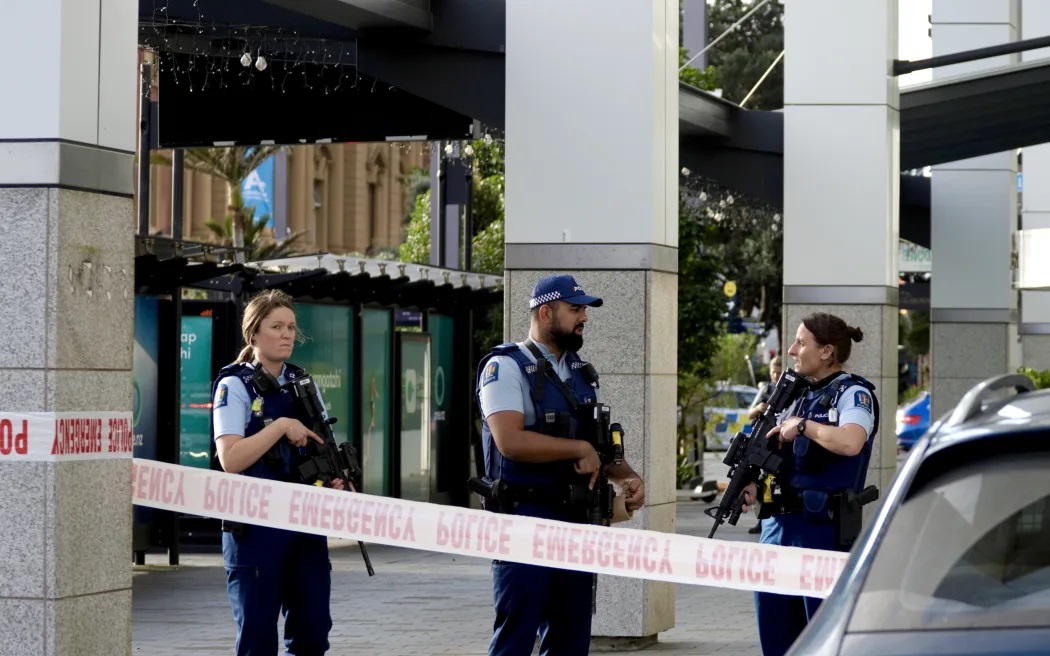‘Concerns’ on amount of gun violence in Auckland central
Monday 23 October 2023 | Written by RNZ | Published in New Zealand, Regional

Armed police officers stand behind a cordon following a serious shooting incident in downtown Auckland on 20 July, 2023. Photo: RNZ / Marika Khabazi/23102303
The day a construction site worker gunned down two people in Auckland’s city centre police also responded to a dozen other callouts across the region that resulted in firearms charges.
On 20 July, many in Auckland were on edge when 24-year-old Matu Reid opened fire at a central city building site, and later died at the scene from what police described as a self-inflicted injury.
The horror unfolded on the opening day of the FIFA Women's World Cup in Auckland after then-Minister of Police Ginny Andersen assured the public the central city was safe.
Police figures provided to RNZ showed the number of firearms callouts that day was triple the number compared to the same day last year, when there had been just four callouts and eight offences.
On the same day of the central Auckland shooting, there were 13 callouts and 17 firearms offences, including a callout to an armed robbery of a van transporting cash in Mt Wellington, which police said is still under investigation.
Within days, there were another two fatal shootings - one in the city centre, the other in nearby Point England.
Police association president Chris Cahill said he was concerned about increasing gun violence.
"These were all within a few days of each other. We monitor what our members are telling us, sending us through information around firearms incidents. We also monitor what the press are reporting and they've gone through the roof in the last few years," Cahill said.
Police figures showed there were an average of six firearms callouts a day across the country, he said.
Central Auckland business association Heart of the City chief executive Viv Beck said the number of shootings in the city centre was alarming.
"The weapons and the violence has just taken things to a level that we haven't seen before and I think people really are concerned. We're concerned and I think actually, people have had enough."
Police figures also showed the number of frontline officers in Auckland Central had dropped slightly since 2019, when there were 126 first and second responders - to 123 now.
Beck said that brought home the need for more police on the beat in the city centre.
"It's incredibly disappointing to see those numbers have gone down, but I'm not surprised, because whilst the police continue to tell us that they're putting more police on the beat, and I think they are ... it was off a very low base," Beck said.
"We are not seeing the sort of levels of resourcing on the street that people expect."
Cahill said the number of frontline police in Auckland central did not match the increase in crime during the past four years.
"I certainly share the concerns of the public that there needs to be a higher visibility of policing. It's not just about being safe, it's about feeling safe," Cahill said.
"While that number drop [of central Auckland frontline officers] might seem small, when you consider the extra demand that increased in that four years, it means that there really isn't enough staff on the frontline in Auckland."
He said officers were also spending crucial patrol time responding to people in mental distress, a job Cahill said was better suited to health organisations.
"For every time an officer is tied up dealing with someone who's in mental distress that means they're not available to be out there on the beat giving reassurance to dairy owners and other retailers."
Beck wanted to see quick action from the National-led government.
"What I want to know is how quickly are we going to see change?
"Are we going to see a downtown police station? - And I know that's an operational matter, but the politicians do set the tone and I think it's very important that we see quick action on this, because we've got to a level that it is disturbing people," Beck said.
Central city residents group spokesperson Antony Phillips was closing in on 20 years of living in Auckland's city centre. The group was also calling for more police on the beat and a bricks and mortar station.
Phillips said he was aware people felt unsafe, although was pragmatic about rising crime.
"I don't feel any less safe than I did five years ago, or 10 years ago. Probably that's because I've always been witness or privy to incidents of violence in the city."
- RNZ












































